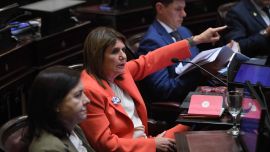Javier Milei’s plan to dollarise Argentina’s economy would create problems without having the country’s"fiscal accounts in line" first, a senior World Bank official has warned.
William Maloney, the World Bank’s chief economist for Latin America and the Caribbean, expressed scepticism on Wednesday over the La Libertad Avanza leader’s plan as he took questions after presenting the latest World Bank report on the global economic output.
Milei finished first in the PASO primaries held on August 13, installing the outsider libertarian as the frontrunner in the upcoming general election.
Argentina’s economy is set to contract 2.5 percent in 2023, according to the World Bank. With over 40 percent of the population below the poverty line and an annual inflation running at more than 124 percent over the last 12 months, the panorama of the region’s third economy is bleak, said the institution.
To resolve this, Milei proposes abandoning the peso and embracing the dollar if he is elected to the Casa Rosada.
The World Bank is sceptical about the 52-year-old’s economist’s plans, said Maloney on Wednesday.
"Having fiscal discipline and low rates of monetary growth – i.e. moderating the amount of money in circulation – is absolutely key to handling inflation," said the World Bank official, who said he is convinced that "there is no alternative."
"And that applies to dollarisation," he added.
"Dollarisation is good for helping to manage inflationary expectations because everybody says: 'Well, the Central Bank cannot print money so that resolves one problem,' but it’s not like that because if you cannot bring your fiscal accounts into line, then you only end up with other distortions and other problems," assured Maloney.
The World Bank is not the first multilateral institution to express concern. A few days ago, the International Monetary Fund (IMF), with whom Argentina has agreed an ongoing US$44.5-billion credit programme, warned that dollarisation is "no substitute for solid macroeconomic policies."
In Maloney’s opinion, controlling inflation “is necessary" in Argentina but to get it, "fiscal balance" and "confidence that the government is serious" are needed.
"It’s too soon to speak of hyperinflation" in the country, understood as monthly inflation of 50 percent, added the economist.
Growth outlook
According to the World Bank, the economic situation in Argentina will pick up next year with a growth of 2.8 percent, followed by 3.3 percent in 2025.
The institution’s forecasts showed Latin America as a whole to lag behind the rest of the world with an average growth of two percent this year, not enough to reduce poverty.
Mexico (3.2 percent) and Brazil (2.6 percent) are growing above average while Colombia and Uruguay (1.5 percent) Ecuador (1.3 percent) and Peru (0.8 percent) are among those below. Apart from Argentina Chile (-0.4 percent) is the only economy set to shrink.
The World Bank is forecasting average growth of 2.3 percent for the region next year and 2.6 percent for 2025, an anaemic growth also insufficient to reduce poverty.
Maloney further regretted that the region lacked "any clear strategy to take advantage of nearshoring and the green transition" while also neglecting infrastructure and the formation of human capital.
The global context, while better than six months ago, does not help with the consequences of high interest rates, low growth in the advanced economies and the uncertain perspectives for China.
The main bright spots for the region were job recovery and the fall in inflation "excluding Argentina and Venezuela, to a regional average of 4.4 percent," superior to many more advanced economies.
The World Bank also urged more rapid progress towards a digital economy.
– TIMES/AFP

























Comments